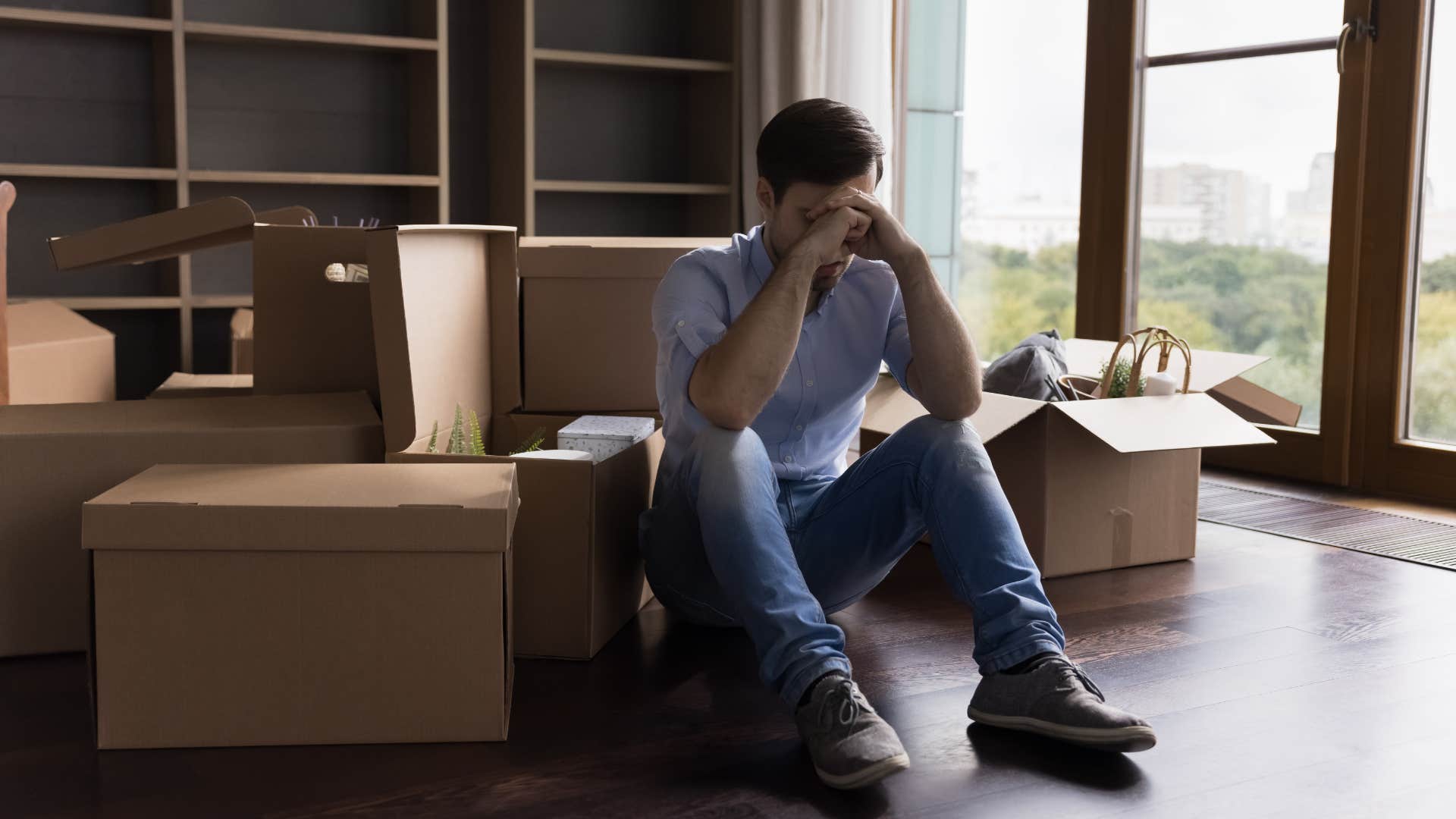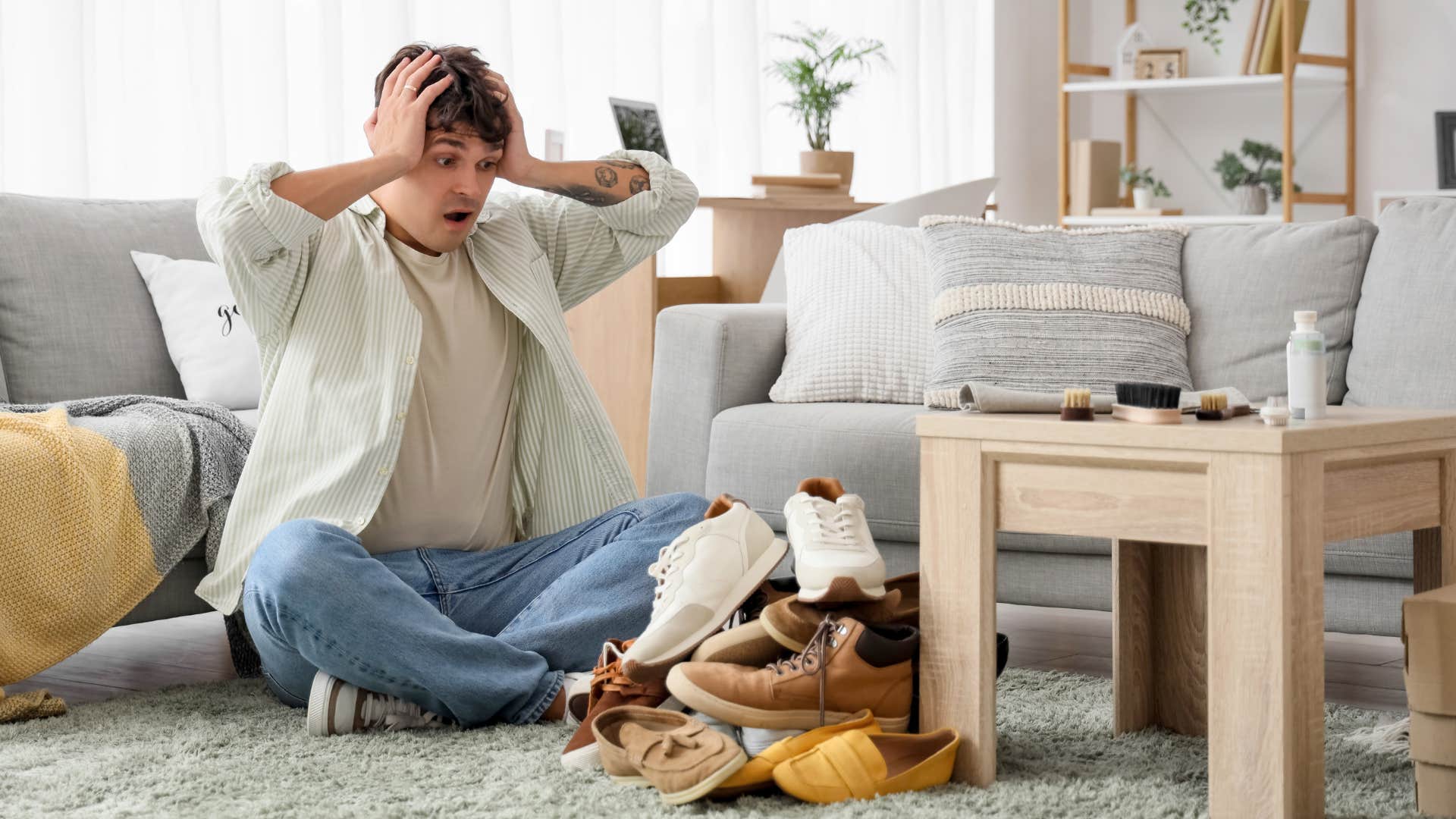People Can Tell You're Seriously Stressed If These 11 Things Are In Your Home
Your living space is a reflection of your internal well-being.
 Dikushin Dmitry | Shutterstock
Dikushin Dmitry | Shutterstock Whether they're still doing work at home or not, studies show that people tend to be more stressed in their living spaces than they are at school or work. From a million household responsibilities to family stress, financial worries, and the visual chaos of clutter, people can tell you're seriously stressed if these things are in your home.
Even if we're not consciously aware of it, our homes are often a reflection of and a contributor to our mental and emotional states. If we're happy, motivated, and secure, our homes reflect that. But, unfortunately, if we're stressed and overwhelmed, the clutter and vibes of our homes can also throw that energy back to us.
People can tell you're seriously stressed if these 11 things are in your home
1. Old boxes and packages
 fizkes | Shutterstock
fizkes | Shutterstock
Many people tend to cope with emotional turmoil and stress with retail therapy, and although it can often offer a fleeting moment of respite and relief, for people struggling with financial stability, it only adds to their long-term chaos. That's why old packages and boxes in someone's home are often signs of a seriously stressed out person.
They spend money online and order things to come in the mail to offer themselves a bit of momentary relief from the stress and strain of the day, but struggle to regain that financial stability and even break down the boxes when those things do come.
2. A million comfort items
 Wayhome Studio | Shutterstock
Wayhome Studio | Shutterstock
Whether it's a weighted blanket on the couch, a million devices and screens scattered around the house, or comfort foods in takeout containers, people can tell you're seriously stressed if these things are in your home. While they offer a bit of fleeting comfort and a temporary boost in mood, they're only escapism that keeps you stuck in a cycle of disappointment and strain.
For example, people who doomscroll on their phones or indulge in mindless entertainment on TV tend to be stuck in a cycle of avoiding the root cause of their stress. They avoid the rest they need to heal burnout and take on additional mental overload and chaos by leaning into screen time as a coping mechanism.
3. Overflowing closets and rooms
 Stock-Asso | Shutterstock
Stock-Asso | Shutterstock
If it's clear that many areas of a person's home are neglected, whether that's an overflowing closet in their bedroom or a room in the house that's rarely cleaned, it could be a sign that they're dealing with stress or mental health concerns. According to a study from the Journal of Psychiatric Research, dealing with ongoing stress is often an indicator of mental health concerns like depression. So, if someone's constantly stressed out, chances are they're experiencing depressive symptoms.
Another study from the Psychiatric Research Communications found that depression can often harm executive functioning — the kind of skills we need on an everyday basis to complete things like household chores and work. If someone's struggling with chores or cleaning at home, it's not always "laziness," but a deeper "red flag" for things like mental health and stress issues.
4. A phone and charger next to the bed
 New Africa | Shutterstock
New Africa | Shutterstock
It might seem like a simple thing, but if it's clear to visitors that you're doomscrolling from your bed before resting or even waking up to a phone alarm first thing in the morning, people can tell you're seriously stressed.
Not only does being on your phone right before bed or first thing in the morning tend to keep people in a spiral of constant anxiety, but waking up to an alarm abruptly in the morning can also push the body into fight or flight before even getting out of bed. It's our devices that might seem like a means of de-stressing and distracting ourselves from internal turmoil, but that, in the end, only keep us stuck in a state of constant stress.
5. Lights that are always on
 aslysun | Shutterstock
aslysun | Shutterstock
If you leave lights on to cope with strain and loneliness at home, chances are that's one of the things that people immediately notice when they come over. Whether it's sleeping with a light on or leaving them on when you're alone at home, it comes from a grasp at control and comfort that you can't seem to fulfill in daily life.
On a metaphorical level, dealing with chronic stress can spark loneliness that feels dark and impossible to escape from. On a literal level, leaving lights on and opening up the space with light can be a coping mechanism for those feelings of despair, even if it comes at the cost of a heightened electrical bill.
6. A sink full of dishes all the time
 Andrey_Popov | Shutterstock
Andrey_Popov | Shutterstock
Doing dishes and other simple chores like folding laundry can often feel impossible when you're stuck in "fight or flight" mode — grappling with anxiety, stress, and loneliness at every turn. So, it's not surprising that people can tell you're seriously stressed if these things are in your home.
Whether it's piles of laundry scattered around the home, general clutter blocking entryways and floors, or a sink full of dirty dishes, all of these things are generally overlooked by someone who's too stressed out and anxious to consider cleaning.
7. A space that feels cold and impersonal
 fizkes | Shutterstock
fizkes | Shutterstock
Especially later in life, a living space can be a reflection of personal identity that cultivates belonging and gives people a safe space to feel like themselves, according to a study from The Gerontologist. However, if someone doesn't have the time, money, or energy to cultivate that kind of space, it only adds to the inner turmoil, stress, and loneliness they're grappling with.
People can tell you're seriously stressed and lonely if your home feels cold and impersonal in these ways. Whether it's a lack of home decor, personal items, or personal flair, the energy of your home doesn't just show itself to guests, but infiltrates your mood and mental health as well.
8. Half-finished organization projects
 Okrasiuk | Shutterstock
Okrasiuk | Shutterstock
Many people who are dealing with burnout or constant stress in their everyday lives may experience small bursts of energy throughout the day. They have the motivation and energy to start a project like organizing their closet or cleaning the house, but it often leads to a quick crash where their body begs for the rest it needs to regulate itself.
That's why people can often tell you're seriously stressed if they notice these half-finished organization projects around the house. It's clear you're not "lazy" or "unmotivated," but rather struggling with a larger issue of stress, mental health, or time that keeps you from finishing things in the moment.
9. A fridge full of expired food
 aslysun | Shutterstock
aslysun | Shutterstock
Whether it's empty or smelling up the kitchen with expired foods you haven't thrown out, people can tell you're seriously stressed if these things are in your home. Even if it's simply harboring stress about the free time you have to do things like grocery shopping, it's clear to guests that you're struggling with something if you don't even bare necessities like food.
While stress may bring changes in appetite that make regular grocery shopping or cooking seem like an afterthought, these are basic habits and rituals that we must do no matter what. If our brains aren't nourished by healthy foods, they don't have the power to fend off overwhelming stress levels and constant anxieties that plague our daily lives.
10. Coats and shoes scattered by the door
 Pixel-Shot | Shutterstock
Pixel-Shot | Shutterstock
When a stressed out, overly anxious, or burnt out person comes home, they're probably not worried about hanging up their coat or tucking their shoes neatly into the closet. They're taking off their coat and throwing off their shoes, trying to get to the next thing or immediately flopping down on the couch to distract themselves.
Even if these little rituals actually bring a little bit of order to the chaos of their minds, they're often overlooked in the grand scheme of struggle.
11. Empty planners and notebooks
 Prostock-studio | Shutterstock
Prostock-studio | Shutterstock
If someone is stressed and overwhelmed enough to invest in a notebook or planner to organize their responsibilities, thoughts, and schedules, chances are they're going through it. But if they're not actually using them, and instead letting them sit on the counter as another reminder of "something to do," chances are they only add more stress and strain to their routines.
Of course, these things are helpful when used, like a physical calendar for tracking "to-dos," but when they're left untouched, they can't do much.
Zayda Slabbekoorn is a senior editorial strategist with a bachelor's degree in social relations & policy and gender studies who focuses on psychology, relationships, self-help, and human interest stories.

